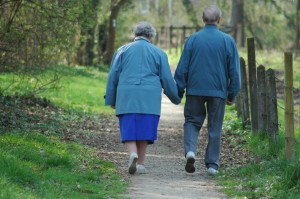Seniors Who Ride Free Walk More Too
 People ages 60 and older who received free bus passes undertook significantly more physically active forms of travel — such as walking or taking the bus — than those who didn’t, a British study found.
People ages 60 and older who received free bus passes undertook significantly more physically active forms of travel — such as walking or taking the bus — than those who didn’t, a British study found.
Compared with older individuals who had not received a free bus pass, those who received free passes traveled more actively, regardless of whether they were of low or high socioeconomic status, according to Sophie Coronini-Cronberg, MSc, of Imperial College London, and colleagues.
The study also showed older individuals with free bus passes walked significantly more than those without a free pass, they wrote in the Sept. 20 issue of the American Journal of Public Health.
In England, a National Bus Pass was introduced for citizens ages 60 and older with limited access in 2006, and was expanded to include all local buses anywhere in England in 2008.
“A key purpose of the concessionary scheme is to increase bus use as a means of reducing social exclusion among older people and, in particular, to ensure access to travel among those on limited incomes,” Coronini-Cronberg and colleagues wrote.
The researchers also noted that the travel access may potentially offer older people incidentally physically active travel, which “may still have a key role to play in keeping older adults physically fit.”
To study this association, the authors performed a regression analysis using data on 11,218 individuals ages 60 and older with free bus passes and 5,693 people without one, collected through the 2005-2008 National Travel Survey.
Respondents were asked about travel habits — which included phases of each journey — and were categorized as “active” or “not active.” Active travel included walking, cycling, and using public buses and trains. Not active travel included use of cars, taxis, motorcycles, and private buses.
Additionally, participants were asked about walking frequency (which ranged from three or more times weekly to less than once a year or never), age, gender, access to a car, population of geographic region, socioeconomic data, whether or not they had a bus pass, and use of bus travel.
From 2005 to 2008, the number of older participants with free bus passes rose from 56.8 percent to 74.7 percent. During this time, the median number of stages per journey decreased among pass holders, although the median proportion of journey stages incorporating physically active travel remained higher among those with the free pass versus those without.
Having the free bus pass was significantly associated with increased likelihood of active travel during the observation period, increased rate of active travel among home owners, increased use of buses, and increased odds of walking three or more times a week compared with those without bus passes.
There was a nonsignificant trend for elevated rate of active travel among participants who did not own their homes and had free bus passes versus those without free passes.
The authors added that previous research showed that “price makes a difference to transportation choice and frequency of use, particularly among those of lower socioeconomic status groups,” though they noted that increased age resulted in reduced active transportation participation.
The researchers also emphasized the net gain offered by the program, citing that physical inactivity was “estimated to cost the U.K. economy £10.7 billion ($16.8 billion) annually,” while the free bus pass program was significantly associated with increased physical activity among older patients and that the program cost £1.1 billion ($1.7 billion) annually.
The authors said the study could not be generalized due to nonresponders and that data were self-reported. They also said they could not determine whether potential health benefits were equally distributed among program participants, and noted that they did not have longitudinal data available.